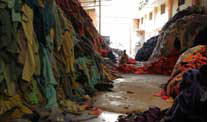
Economic anthropologists study processes of production, circulation and consumption of different sorts of objects in social settings. ‘Objects’ includes material things, as well as what people do for each other (such as provide labour and services) and less visible objects (such as names, ideas and so forth). The settings range from small and intimate social units like households through intermediate ones, like firms, villages or local markets, to very large entities like regional systems of ceremonial exchange or global systems of advertising and consumption.
While the settings and processes that are studied vary tremendously, most economic anthropologists approach them in two main ways. One approach is concerned with social context: what sorts of people make, give, take or consume which sorts of things, and in what sorts of situations do they do so? In a sub-Saharan African village, who is it who tends food crops – men or women, old or young, married or single, and so forth? In England, which sorts of households are likely to have computers, and which household members are likely to use them? Another approach is concerned with cultural context: how do different sorts of people understand their economic activities, the objects involved and the people with whom they carry out those activities? When an artisan sells something to a buyer, how does each party think about their relationship and the objects that they exchange?
Thus, while economic anthropologists study economic processes, their approach is different from that of economists. Economists usually restrict themselves to monetary transactions and try to develop formal, abstract models of economic systems. Economic anthropologists, on the other hand, usually are concerned with all forms of production, circulation and consumption, monetary or not. Further, they are concerned less with developing formal models and more with trying to describe and understand economic actions in their social and cultural context.
Text written by Dr. James G. Carrier
Postgraduate programmes in the UK
* Various universities provide a module or unit on Economic/ Business Anthropology but currently there are no postgraduate degrees in this specialisation in Britain*
Recommended Resources
Film
The following trailer is for Unravel, a film distributed by the RAI Film.
Unravel
Director Meghna Gupta
Country/Production UK
Release 2012
Length 14 mins
Format Colour / DVD / PAL / All region
Location India
Unravel follows the Western worlds least wanted clothes, on a journey across Northern India, from sea to industrial interior. They get sent to Panipat, a sleepy town and the only place in the world that wants them, recycling them back into yarn.
Je Ne Suis Pas Moi-Même
Director Alba Mora, Anna Santamaria
Release 2009
Length 50 mins
Location Cameroon & Brussels
Language English, French (English subtitles)
Prizes/Commendations Material Culture Film Prize 2009
Shot in Cameroon and Brussels, Je ne suis pas moi-même examines the complex network surrounding the international market of African antiquities, and the contradictions in a European art market hungry for new tribal objects. Where do the African masks come from? What journey do these masks make before their unveiling in the windows of the biggest galleries or art collections in Europe? Who determines the economic and aesthetic value of these objects now that colonialism is supposedly dead? And then there’s a continent called Africa, in need of economic resources and therefore willing to sell its cultural heritage or, if need be, to fake it. The authenticity of the objects becomes blurred when the people that once adored them start to sell them.
RAI Film is the Film section of the Royal Anthropological Institute (RAI). Their Ethnographic Film Catalogue is an extensive ethnographic film catalogue (over 600 titles) that are variously available to purchase as DVDs, personal rent on demand (Vimeo VOD), and accessible to institutions via our online streaming partners for educational and academic purposes. The following films are examples of anthropology of economic anthropology: To Live with Heards, A Life with Slate, Sons of Haji Omar, The Whale Hunters Lamalera, Steel Lives, Garden Days: Village in Papua New Guinea, Copperworking in Santa Clara del Cobre.
General
https://www.rethinkeconomics.org/ – An ESRC funded seminar series on local and international economic developments.
http://www.thememorybank.co.uk/ – Professor Keith Hart’s website provides a lot of information on various aspects of economic anthropology.
http://www.dictionaryofeconomics.com/dictionary – The New Palgrave online dictionary has a good description of economics.
Books
The Memory Bank: money in an unequal world
Hart, Keith (Profile Books, Lt. 2000)
Economic Anthropology
Hann, C. and Hart, K. (Polity Press, 2011)
Economies and Cultures: Foundations of Economic Anthropology 2nd
Ed. Wilk, R. R. and Cliggett, C. L. (Westview Press, 2007)
Professional Organisations, Groups & Associations
Society for Economic Anthropology – a group of 300 anthropologists, economists, geographers and scholars interested in the connections between economics and social life.
Society for the Anthropology of Work– An interest group of the American Anthropological Association.



